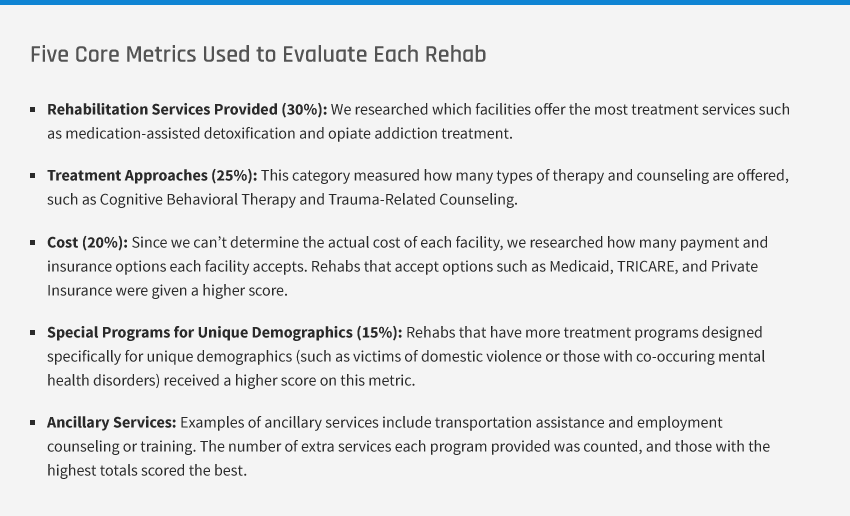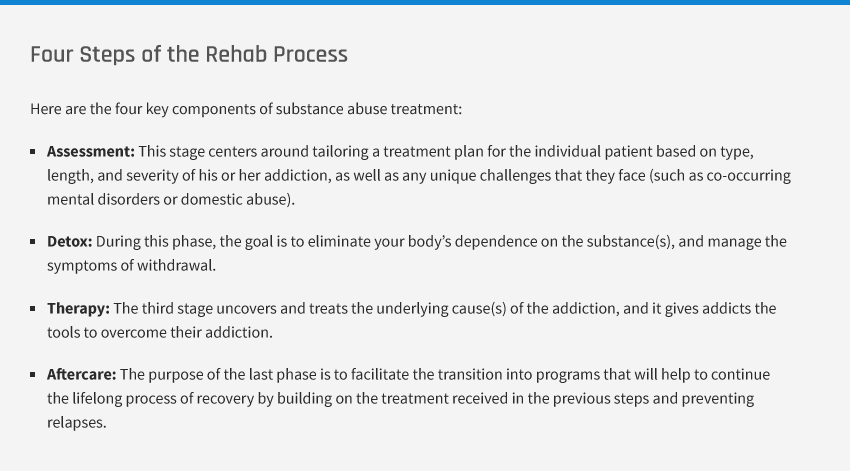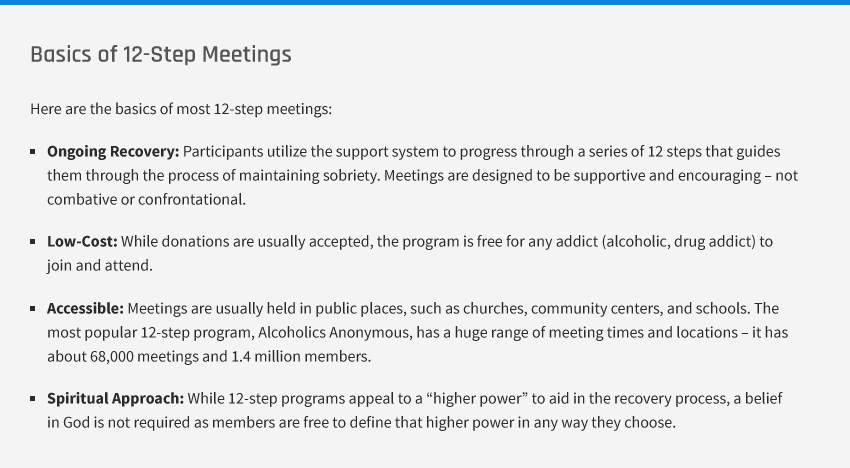Another problem substance in Las Vegas is alcohol. In Clark County, alcohol is responsible for the fastest increase in the number of deaths in the county due to substance abuse, as well as 61.89% of all drug and alcohol-related deaths from 2013 to 2017.
Alcohol, Drug, and other Rehab Centers in Las Vegas, NV
TABLE OF CONTENTS
Getting Help
What to Consider When Choosing a Rehab Center
When considering which rehab programs and treatment options to explore, some good questions you could ask are:
- Which service setting is best for me? Read the following articles to learn more about residential inpatient programs and outpatient programs.
- Which specialized rehab programs do I need? Find out about the differences between holistic rehabs, rehabs for dual diagnosis, and programs specifically for alcohol and drug detox.
- How long should I stay? Consider the impact of a shorter rehab length (30 days) on your recovery efforts, or a longer-term option (60, 90, or 120+ days).
There are many rehabilitation options available, designed to provide a wide range of services available to frame your substance abuse recovery efforts to fit your unique personal needs.
For more information on how to make all of these decisions, read our guide to Choosing the Right Rehab.
The Best Rehabs in Las Vegas, NV
Depending on your location and personal needs, the cost of rehab can be high. Regardless of your insurance, there are ways to get help breaking free from your addiction. As well as the financial implications of choosing a rehab facility, it is important to consider the quality of the treatment provided there.
Emerging research has paved the way for many new techniques to combat substance abuse– our research outlines what therapies the top facilities in Las Vegas offer. We use five core metrics to score rehabilitation facilities, and you can learn more by reading about our research methodology and ranking process.
The Substance Abuse and Mental Health Administration (SAMHSA) reports that there are 23 licensed substance abuse treatment centers in Las Vegas and 41 centers within 25 miles of the city center. Many of these facilities have resources to assist people with low incomes or minimal insurance coverage. Along with many rehab and counseling centers, Las Vegas also provides needle-exchange services for free through the Trac-B Exchange Program, who also connect clients to social services. Through our research, it has been found that the Desert Hope facility scores highest in Vegas overall based on our five core metrics.

We use five core metrics to evaluate the quality of each facility. For more information, feel free to read a full breakdown of our filtering process and ranking methodology.
1: Desert Hope
Because of the wide range of therapies and ancillary services available to clients at Desert Hope, this facility has scored the highest among competitors in our research on rehab centers in Las Vegas. Among their 38 different ancillary services, a category where this center scored 10 points, clients can access case management, peer-run support, housing services, community outreach, and various types of aftercare counseling settings.
Rehabilitation services and treatment approaches offered are other categories that this facility scored 10 points in, as they offer treatment for all ranges of the detox process, and aftercare for successful lifelong rehabilitation. As well as a comfortably medicated detoxification period, physicians are available to prescribe medication and offer cutting-edge treatments like Cognitive Behavioral Therapy (CBT) and Dialectical Behavioral Therapy (DBT), and community reinforcement vouchers, in addition to more traditional 12-step process models.
This center scored lowest in the cost category, with only 2.5 points, due to their high costs. However, a sliding fee scale may be available to those with low incomes and other qualifying factors- please call to verify available financial assistance programs. As well as private health insurance, clients here can pay with state-funded insurance options or their own funds.
- Rehabilitation Services Provided: 10
- Treatment Approaches: 10
- Cost: 2.5
- Special Programs for Unique Demographics: 7.15
- Ancillary Services: 10
2: Westcare Nevada Inc Community Triage Center
This group received the highest possible score possible, 10, for treatment approaches. In addition to detoxification with and without medication, patients here can receive substance abuse treatment with or without medication, and relapse prevention with naltrexone. In addition to substance abuse treatment, people are admitted with co-current psychiatric disorders and treatments are tailored to treat existing conditions with psychiatric medications needed. Those living with AIDS or HIV are also treated here, and special counseling is provided as well for those patients. Aftercare is also provided by this center, including continued therapy and education.
The category this group scored lowest in was special programs for unique demographics- there are services for the hard of hearing available, however. Other categories received high average scores, as this center has a wide range of counseling and ancillary services, as well as relatively affordable rates and a sliding-fee scale. In addition to serving adult men and women struggling with substance abuse, this center has community services and outreach programs to invite at-risk groups outside of the center to participate in drug-free education and activities.
- Rehabilitation Services Provided: 10
- Treatment Approaches: 5.01
- Cost: 6.25
- Special Programs for Unique Demographics: 4.29
- Ancillary Services: 7.28
3: Community Counseling Center
While this facility scored well in many categories, the strongest score of 8.35 was attributed to the wide range of treatment options available here. This facility offers substance abuse treatment and detoxification with medication, including medications for psychiatric disorders, in addition to a wide scope of behavioral therapies. From cognitive behavioral and dialectical behavioral therapy to rational-emotive behavioral therapy, brief interventions, and trauma-related counseling, this counseling center is dedicated to analyzing the underlying causes for substance abusing behaviors and helping people change their need to self-medicate by realizing their inner needs. They also utilize group therapies, anger management, community reinforcement vouchers, and the 12-step approach to therapy.
Residents of this facility are able to access a variety of programs for special demographics, such as veterans, transitioning young adults, and the hard-of-hearing. Price was a category that this group scored lowest in, at only 2.5 points, but they accept payment assistance programs and have a sliding fee scale for private pay residents unable to use their insurance to pay for rehab services. For those addicted to nicotine, residents are able to smoke in designated areas here, and there are nicotine-cessation programs, tobacco screening, and counseling available for quitting cigarettes.
- Rehabilitation Services Provided: 6
- Treatment Approaches: 8.35
- Cost: 2.5
- Special Programs for Unique Demographics: 5.72
- Ancillary Services: 6.37
Top-Rated, Low-Cost Treatment Centers in Las Vegas
| Rank | Rehab | Total Score | Contact Information |
| #1 | Desert Hope | 8.1 | 2465 East Twain Avenue Las Vegas, NV 89121 Main Tel: 702-789-6203 Intake Tel 1: 866-537-6237 Intake Tel 2: 702-789-6201 |
| #2 | Westcare Nevada, Inc. Community Triage Center | 6.9 | 930 North 4th Street Las Vegas, NV 89101 Main Tel: 702-383-4044 |
| #3 | Community Counseling Center | 5.9 | 714 East Sahara Avenue Suite 103 Las Vegas, NV 89104 Main Tel: 702-369-8700 Intake Tel 1: 702-369-8700 x0 |
| #4 | Southern Nevada Adult Mental Health Co-Occurring Program | 4.8 | 616 West Charleston Boulevard Las Vegas, NV 89146 Main Tel: 702 486-6045 Intake Tel 1: 702 486-6408 x0 |
| #5 | Salvation Army Adult Rehabilitation Center | 2.6 | 211 Judson Avenue North Las Vegas, NV 89030 Main Tel: 702-399-2769 Intake Tel 1: 702-399-2769 x10 |
| #6 | Vitality Unlimited Restoration Counseling Services – Satellite Office | 0.9 | 6885 West Charleston Boulevard Las Vegas, NV 89117 Main Tel: 702-629-7799 |
Finding a Substance Abuse Treatment Center in Las Vegas
Start by determining your coverage
You can determine your best rehabilitation facility options once you have determined your health insurance coverage- facilities often have varying insurance and payment requirements. To find out your coverage, call your insurance provider and ask what is available to you. Low-income residents may qualify for Medicaid, Medicare, or other state and federal programs to help pay for medical necessities like substance abuse treatment. Visit benefits.gov to learn more about state and federal options you may qualify for. Regardless of the type of insurance, public and private companies cover substance abuse treatment for qualified individuals.
Use our database to find a treatment center near you
In the tool below, you can see all of the treatment centers in the state of Nevada recognized by the Substance Abuse and Mental Health Services Administration (SAMHSA). Put in your zip code and choose the filter icon to find relevant rehabs in your area.
Schedule an assessment
The first step to pursuing substance abuse treatment will be to reach out to a qualified individual that can conduct an assessment, such as a therapist, counselor, or social services worker.
If you are pursuing treatment that will be covered by insurance, your first step will likely be scheduling an assessment by a qualified individual such as a therapist or counselor. Most facilities provide assessments, or your primary care provider may be able to refer you. Contact companies in our database above to find out if they will provide this service.
Find a Rehabilitation Facility Near You
Filter Your Search
Popular Searches
Type Of Care
Treatment Approaches
Service Setting
Age Groups Accepted
Ancillary Services
Facility Operation
Facility Smoking Policy
Gender Accepted
Language Services
License Certification Accreditation
Payment Assistance Available
Payment Methods and Insurance Accepted
Special Programs Groups Offered
What to Expect in Rehab
With emerging sciences, there are new rehabilitation therapies and techniques available all the time. According to the National Institute of Health, research shows that no single treatment will be effective for every individual, and it is an individually unique combination of therapies and settings that will produce a beneficial environment in which a person can break free from their addictions.

For more on what to expect in rehab, read our guide on the addiction rehabilitation process.
Finding Aftercare in Las Vegas
According to research by the National Institute on Drug Abuse (NIDA), the chances of relapse and fatal overdose increase significantly when proper aftercare is not procured after substance abuse treatment. Furthermore, recovery success is found to be highest when individuals participate in rehabilitation efforts as well as long-term participation in aftercare activities. There are many aftercare options, such as:
- Follow-up visits for continued therapy
- Sober living homes
- Group therapy, through the rehab facility or a community setting like AA
Alcoholics Anonymous (AA), and later Narcotics Anonymous (NA) designed the 12-step process to help those recovering from alcohol and drug addiction by participating in support groups in the community nationwide, often help in places like churches and clinics.

Contact the appropriate local organization to find an AA or NA meeting near you
We created a directory (see below) of local organizations in Las Vegas that can connect you to 12-step meetings through Alcoholics Anonymous or Narcotics Anonymous. Because meeting times and locations change periodically, it’s best to call ahead and make sure the information you find online is accurate.
Alcoholics Anonymous (AA) and Narcotics Anonymous (NA) Database
| Name | City | Program | Telephone | Spanish Hotline |
|---|
Sober Living Homes
Studies show there are many benefits to living in a halfway house (or certified recovery residence) while undergoing substance abuse rehabilitation. People living here are expected to adhere to a strict set of rules that revolve around self-care, including a no-tolerance policy to drug and alcohol use. This sets the person up for success when attempting to remain sober and independent while living in society. Each home has its own rent, chores, and support group systems, often peer-based, which residents are expected to participate in. Various counseling services help residents learn the skills they will need to cope with life after substance abuse.
To find out more about halfway houses in Las Vegas see our database, or select the appropriate filter from our tool above. You can also read our guide to sober living homes, and search for a certified recovery residence in your area.
Substance Abuse in Las Vegas
Las Vegas has a growing problem with alcohol and heroin
According to data collected by the Center for Disease Control, two out of every three drug overdoses in America involve an opiate. In Las Vegas, only half of all overdoses are attributed to opiates, and the number of heroin users has been growing much faster than those that use pharmaceutical opioids.
7.42%
increase in total heroin-related deaths in Clark County, 2013-2017
62.69%
increase in the drug & alcohol deaths in Las Vegas, 2013-2017
Drug Overdose Deaths in Las Vegas, 2013-2017
| Year | Opioid Overdose Deaths | Heroin Overdose Deaths | Alcohol Overdose Deaths | Cocaine Overdose Deaths |
| 2013 | 186 | 42 | 361 | 51 |
| 2014 | 171 | 54 | 423 | 38 |
| 2015 | 210 | 62 | 494 | 48 |
| 2016 | 171 | 63 | 519 | 40 |
| 2017 | 177 | 67 | 525 | 50 |
| % of All ODs | 25.39% | 7.68% | 61.89% | 6.05% |
Source: CDCWonder
Alcohol appears to be the most abused substance in both Las Vegas and Nevada
Alcohol overdoses have risen in Vegas and across the state in recent years, as well as deaths caused by chronic alcohol abuse. Alcohol-related overdose rates in Clark County have risen 45% between 2013 and 2017, which is very close to the state’s rate, however, deaths from alcoholic liver disease have risen faster than in the rest of state.
100%
increase of deaths due to alcoholic liver disease between 2013 and 2017 in Las Vegas
67%
increase of deaths due to alcoholic liver disease between 2013 and 2017 in Nevada
Another concerning statistic regarding alcohol abuse in Vegas is the number of DUI arrests, which rose 6.02% from the year 2016 to 2017, according to the City of Las Vegas Police Department. In addition to DUI reports, you can see excessive drinking reported in national and state health surveys. According to the 2015 Nevada Behavioral Risk Factor Survey, reported heavy drinking rates are worse overall throughout the state than in Vegas, but binge drinking is slightly higher in Vegas than the rest of the state.
Source: CDCWonder
Drug overdose deaths are a major concern among youth in Las Vegas
In the years between 2008 and 2017, there were four times more overdoses in Vegas than in the US overall. When overdoses are grouped by age, we also see that 10% of overdoses are by people under 18. Another troubling statistic regarding the youth in Nevada is the number of people under the age of 25 reporting they need substance abuse treatment and are not actively seeking rehab- in 2015, the number was three times higher than that of adults over age 25 who need but don’t seek treatment.
8.67%
of Las Vegas deaths for those ages 12-17 between 2008 and 2017 were caused by drugs and alcohol
4.92%
of US deaths for those ages 12-17 between 2008 and 2017 were caused by drugs and alcohol
The number of overdoses among youth, as well as the low rate of seeking treatment, may be why the percentage of deaths that were induced by drugs and alcohol for those under 18 is almost twice as high as the national average. Data from CDC Wonder shows that only 4.9% of youth’s deaths in the US are connected to drugs and alcohol, while about 8.7% of the death of those under 18 in Las Vegas are induced by drugs and alcohol.
Source: CDC Wonder
Clark County Drug and Alcohol-Induced Deaths Between 2008 and 2017
| Ages: 12-17 | Ages: 18+ | All Ages | |
| Drug-Induced Deaths in Clark County | 45 | 19,237 | 19,293 |
| Alcohol-Induced Deaths in Clark County | 8 | 4,007 | 4,015 |
| Total Deaths in Clark County | 519 | 164,607 | 167,128 |
| Percentage of Drug & Alcohol-Induced Deaths in Clark County | 8.67% | 14.12% | 13.95% |
Source: CDC Wonder
Key Indicators of Substance Abuse
Reported drug use among the homeless has risen dramatically in Clark County
Volunteers conduct point-in-time (PIT) reports to determine the number of homeless people in Vegas that can be counted in one night each year, as well as to ask them questions such as where they live and what contributed to their homelessness. In 2018, PIT surveyors discovered that:
- 38.9% of respondents report abusing substances in 2018, up from 35.7% in 2017.
- 44.7% of respondents in 2018 have a mental illness, 54.3% suffer from depression, and 21.2% have PTSD. Of these respondents, up to 75% report not being able to work due to mental health factors.
- 18% of the homeless reporting mental illness cited that substance abuse is the reason why they are homeless
Homeless Population and Drug Use in Clark County, 2013-2018
| Year | Homeless | Unsheltered | Drug Use Reported |
| 2013 | 7,355 | 4,435 | 669 |
| 2014 | 9,417 | 5,468 | 843 |
| 2015 | 7,509 | 3,916 | 2,057 |
| 2016 | 6,208 | 3,731 | 1,688 |
| 2017 | 6,490 | 4,353 | 2,171 |
| 2018 | 6,083 | 3,884 | 2,366 |
| Percent Change |
-17.29% | -12.42% | +253.66% |
Suicides more prevalent in Clark County than in the U.S.
While we may never know the full picture behind a person’s suicidal actions, studies show that mental illness and substance abuse are among the highest contributors to the taking of one’s own life- research shows that even among recovering drug users, one out of eleven who have used within the past year have recently seriously contemplated suicide.
24.59%
Suicides in Clark County have increased 24.59% between 2013 and 2017
18.13%
Suicides in the US have increased by 18.13% between 2013 and 2017
In Clark County, the rate of suicides has been consistently slightly higher than the rate of suicides overall in America between the years 2013 and 2017.
Source: CDC Wonder
Take Action
Las Vegas has a multitude of social services and non-profit organizations who are determined to keep the population safe and off illicit street drugs. Using our tool, you can discover a rehabilitation center near you, determine your insurance coverage, and your own rehab needs. There are many affordable options available to low-income residents or those otherwise unable to access effective substance abuse treatment.


